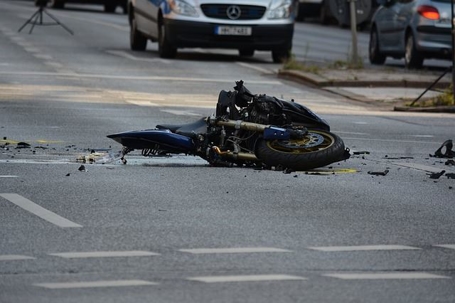Many people enjoy riding motorcycles and love the thrill of being on the open road, but with this thrill comes the serious risk of injury. Motorcycle accidents are much more likely to be deadlier or to cause catastrophic injury.
In 2018, in North Carolina, the DMV reported there were nearly 274,000 passenger car crashes, but that only 866 were fatal, meaning only 0.3%. As compared to 3,566 reported motorcycle crashes, and 176 of these were fatal, meaning about 5%. While this may not seem like a large number, when looking at these statistics together, we see that motorcycle accident are 16 times more likely to be fatal than regular car crashes in North Carolina. The DMV also reported that 2,806 of motorcycle crashes resulted in injury, that’s about 79% of motorcycle crashes ended in injury.
The National Highway Traffic Safety Administration (“NHTSA”) reports that nationally motorcyclists are 28 times more likely to die in a motor vehicle accident than passenger car occupants. However, there are things that can help increase safety, such as good balance, coordination, and judgment. The NHTSA also urges people to be road-ready. This entails being properly licensed to ensure you’re ready to ride, practicing with your motorcycle to get familiar with it, and checking on your motorcycle before every ride. You should be looking at things like tire pressure, brakes, headlights, and signal indicators. Lastly, it’s very important that you have the right protective gear that meets Department of Transportation standards, most importantly a strong helmet.
There are many situations that can are the cause of motorcycle accidents, but here are some common ones:
- Drivers of passenger cars failing to see a motorcyclist and turning into the path of the motorcycle;
- Drivers speeding or driving under the influence;
- Lack of experience;
- Motorcyclists driving during dark; or
- Drivers are distracted by a phone or another passenger.
Injuries in motorcycle crashes can vary, but some typical ones are:
- Lower extremity injuries to the legs or feet;
- Head injuries, including traumatic brain injuries;
- Neck and back injuries;
- Broken bones;
- Spinal cord injuries;
- Partial or complete paralysis.
What To Do After a Motorcycle Accident:
It’s important to know that you will likely be in shock after the accident. The adrenaline rushing through your body may make it hard to identify all your injuries. What to do will also be affected by how injured you are.
- First, if you are able to, you should get to a safe spot. It is important to get out of the road and out of any oncoming traffic.
- Call 911 if you are or anyone else is injured. Even if you do not think you are seriously injured, you should still call the local police to inform them about the accident.
- Look for other witnesses. It can be extremely helpful to have someone else, other than those involved with the accident, to give a statement about what they saw.
- Take pictures. You should take as many pictures of the scene, your bike, any injuries you have, and any other vehicles involved in the scene. It can also be helpful to take notes, so that way you can recall as much as you need to later.
- Seek medical attention. Even if you don’t think you have any serious injuries, something could still be wrong. It is better to see someone and double-check that everything is alright.
- Contact your insurance company to make them aware of the accident.
- Contact an attorney. An attorney can help sort everything out for you and make sure that you are getting what you need and deserve after this accident.
What to Avoid Doing After a Motorcycle Accident:
- Unless you’re having trouble breathing, don’t remove your helmet or other protective gear. If you feel like you’re injured it is best to leave everything on and wait for paramedics to arrive and remove this gear.
- Do not talk to others about what happened. When the police arrive, you should tell them what happened with as many facts as you know, but don’t guess about anything you don’t know.
- Once you’ve involved an attorney, don’t talk to anyone about the accident. Your attorney can handle any questions people may have while keeping your claim protected.
If you have been injured in a motorcycle accident, please contact one of our experienced personal injury attorneys at Jetton & Meredith.

